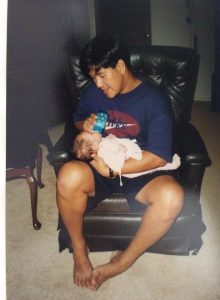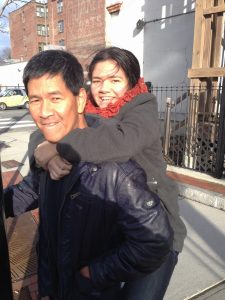The Stay-at-Home Dad
My father was born and raised in a large family of 10 in rural Philippines. Coming from a poor neighborhood, he faced many struggles in his childhood and experienced many things that a child should never have to experience, like extreme poverty, hunger and street violence. Despite all these hardships, my dad managed his way into a better life. With the help of his older brothers, he graduated from college with a degree in medical science. When the opportunity came up to earn money in Saudi Arabia, he took it without second thought.
From there on his life quickly changed. He met my mother in Saudi Arabia and soon he was moving back to a brand new country. When he first arrived in Australia, he faced yet another hard challenge – finding a job in a developed nation. This was mainly due to the fact that his college degree was not officially recognized by Australian standards. So, with my impeding birth, he was forced to take on the role of the “non-traditional” stay-at-home dad.
His role as a stay-at-home dad continued on until I was two years old, when he finally found a job as an airline worker. Dad insists that he loved looking after me when I was a newborn, however, my mother believes that he would’ve rather been working.
“He was a lot better in himself when he did get work. I don’t think he liked not working” – Catherine
After looking back on the interviews I think he felt this way for two main reasons. Firstly, he wasn’t providing for his new family and even though he didn’t ascribe to traditional gender norms about things such as housework, he felt partially worthless. Secondly, coming from a poor background, my father has been working since he was an early teenager, though at that time it was only on the streets. Thus, for him to suddenly stop working at a crucial time when he had just added two new people to his family must’ve been very hard. Even now he often says that if our family were fortunate enough to win the lottery, he would continue to work and provide for the family.
My fathers non-traditional gender role went past simply being a stay-at-home dad. Housework was an aspect of family life that my father never failed to participate in. Prior to finding full-time work, my father was doing the vast majority of the housework all the time, possibly around 95% or maybe even higher. But even after he did finally find work full-time, he never left the housework to my mum. Ever since he began working, the housework has switched to an equal split. This idea of equal housework split is something not seen much in Western cultures and I think this is partially why he acts this way. Coming from a third world country, my father doesn’t give much thought to Western gender norms.
“If I can help, I help. If I can’t, I can’t.” – Angel
As a shift worker, my fathers time with my brother and I was often sparse and very random. Some weeks I would see him briefly late at night before I turned in for bed, and other weeks he would be off for four days in a row. Regardless of his work schedule, family was always and continues to remain his number one priority and he would not give work a second thought if his family needed him. In hindsight of hearing other’s experiences with their own fathers, I realize how fortunate I was to spend so much time bonding with my father, especially when I was young. He has instilled in me great family values that will carry through my entire life.



Leave a Reply